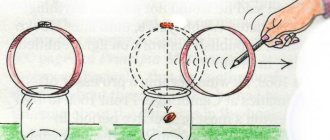From early childhood, a child experiences first-hand the entire range of emotions inherent in an adult. This includes envy, when you want the same toy as the neighbor’s kid, and rage when you fall and get hurt, and curiosity, and love... Kids feel their feelings in their purest form, they still do not know evil intent. For example, even if he is greedy and does not want to share what he has, a child will never behave like a stingy person.
“Stingy” does not mean “greedy”. This is a much more hypertrophied and harmful quality for the human soul, when calculation is connected to simple greed. In this article we will look at what it means to be stingy, whether it is possible to get away from your own stinginess and whether there is at least something useful in this trait.
What does stinginess mean - definition?
A stingy person does not want to help loved ones and those in need. He is unable to share available resources, even if they are in abundance .
It is difficult and unacceptable for him to part with material savings. Stinginess is characterized by a dislike of spending, expenses, spending property, and wealth.
Lack of generosity implies not only a reluctance to part with money, but also an inability to share spiritual wealth and existing knowledge.
A miser is often extremely thrifty with temporary resources. He does not allow himself to spend minutes supporting others if such a waste of time is to his detriment.
Stinginess, as a personality quality, is perceived in two ways in society. On the one hand, such a trait is welcomed: “Stinginess is not stupidity.” In this case, a positive characteristic is implied - moderation in words, which means the ability to complete a task quietly, silently, without unnecessary boasting. Stinginess is sometimes interpreted as a synonym for frugality: “That’s why he’s rich because he’s stingy.”
On the other hand, lack of generosity and excessive frugality are sharply condemned. Misers are reproached for their insatiability: “A stingy person is like a bottomless tub; there is nothing to fill it with.”
This trait is regarded as:
- a sign of weakness of spirit;
- is considered unpromising;
- unhelpful, leading to losses and mistakes: “The miser pays twice.”
Should I build a relationship with a greedy man?
You can determine how a man behaves, whether he is greedy, at the dating stage. Then decide whether to continue the relationship with him. Take a closer look at him, look at his face, clothes, car, etc. The presence of old, worn things, if the man is far from poor, should alert you.
The offer to split the bill at a cafe or buy ice cream on a date should definitely make you think of greed.
The absence of flowers presented on first dates can indicate a man’s stinginess. However, not all representatives of the stronger sex believe that a bouquet can interest a woman. Well, there are such representatives of the stronger half... Ask him to give you flowers and watch his reaction. If you still don’t get what you want, it means the man is greedy.
What is the difference between greed, avarice, frugality?
Stinginess has similar features to greed. For example, these qualities are impossible without a person’s spirit of competition, the need to possess both material and non-material benefits. Greedy and stingy people do not want to share because they strive to hoard.
However, there are also differences. A greedy person is characterized by the desire to satisfy a need at any cost , to fulfill a desire. He tries his best to improve his well-being. He not only owns, but also consumes.
In contrast to the stinginess of a greedy person for others, a stingy person is stingy with himself. He is characterized by stinginess - excessive tight-fistedness, penny-pinching. He deprives himself of the opportunity to use even what he has in abundance.
He infringes on himself in things, food, pleasures, information, rest. A miser may suffer from hunger with overflowing bins. He will wear out his cast-offs, not allowing you to buy new things if you have free money in your wallet.
A miser is characterized by pettiness. He pays increased attention to minor expenses, takes into account every penny, the slightest personal return. He, like the miser, is attached to his own money. There is a bit of commercialism in it. In spending and investing, this is a prudent, selfish subject. A miser will not spend a penny if there is no benefit expected.
Explanatory dictionaries often do not distinguish between greed and stinginess. However, there is a fundamental difference between them. Greed refers to the desire to get more, and stinginess refers to the desire to spend less. The greedy subject is focused on increasing wealth. A frugal person is obsessed with cutting spending.
Stinginess and frugality are not equivalent qualities. Thrift means :
- economy;
- homeliness;
- thrift;
- accuracy;
- moderation.
This is a reasonable and efficient use of time, energy, and material resources. This quality does not imply depriving oneself of benefits for the sake of preserving wealth.
Stinginess is based on fear of loss, fear of lack. Such experiences motivate a person not to give away any resources, even if giving away would not cause problems. Thrift and stinginess are somewhat similar.
But a thrifty, economical person invests resources to preserve property. She makes and alters things with her own hands, for example, she knits hats, reupholsters furniture, and makes a cabinet to save money.
Improvements are unacceptable to a miser if they involve costs for materials. A thrifty person is modest in his demands, but he is ready to spend money on personal needs if necessary. The miser infringes on himself in everything.
Behavior of women that provokes men to greed
A woman’s behavior often provokes a man to have a certain attitude towards her. Being a reasonable person, he can offer her to pay the bill for herself. Especially on the first date. Or he will choose an inexpensive establishment.
Such representatives of the stronger sex use their first meetings not only for getting to know each other, but also in order to understand the girl’s attitude towards money and draw appropriate conclusions.
Young people display this attitude:
- To those women who order expensive dishes in a restaurant. In this case, the man will most likely decide that his companion wants to use him as a sponsor. This especially applies to girls who, after dinner, want to quickly end the date and break up with him.
- To those representatives of the fair sex who constantly hint to a man about their requests. The suspicion that the girl is trying to improve her status at the expense of his money can make a partner stingy. Buying branded items, going to trendy cafes - everything that a girl doesn’t really like, but is only prestigious. And the man himself must have a suitable position and be willing to spend money on her. There are few guys who would like this state of affairs.
- To those women who evaluate others according to their income. For example, if a girl is not interested in a man as a person, but seeks to find out his income and expenses, where he spends most of his time, etc. She will most likely be suspected of commercialism. Most men prefer to part with such young ladies quickly.
This behavior quickly leads the curmudgeon to think about the selfish purpose of getting to know him. And a woman can simply test him for generosity without being mercantile. Young ladies need to remember that it is sometimes impossible to correct the first impression. Therefore, if you like a man, perhaps you should not do this. This will only push him away from you or make him distrust you. You can find out how miserly a man is in other ways.
How to recognize stinginess?
Stinginess is the opposite of generosity.
A generous person gives freely, without intent, on his own initiative, without coercion. He experiences pleasure and joy from giving. The gratuitous transfer of existing goods makes him happy.
A stingy person is a miser. He avoids, evades, refrains from transferring property - material wealth, spiritual wealth. He finds the idea of parting with property difficult and inconvenient . A decrease in personal reserves confuses him, makes him irritated, angry, and unhappy.
Stinginess is usually associated with finances. Charity is not acceptable to stingy people. They have difficulty renting things or lending money to others. They take more and give less.
Hoarders go to great lengths to “save” money. For them, saving money is a priority. Such a person sacrifices an excessive amount of time and energy in order to maintain his personal budget. For example, he will choose a grueling, long but cheap bus ride rather than take advantage of the comfortable but expensive airline offers.
Hoarders like to borrow things rather than buy their own. As soon as they borrow something, they forget about the need to return it. They use other people's property and opportunities without a twinge of conscience.
For example, instead of using their own paid mobile Internet to work in comfort, they will go to a public institution with free access to the network. This manner irritates others.
The desire to retain personal wealth at any cost is a trait of self-centered people. Such people do not care about others. Many people call stingy people “takers” rather than “givers . Lack of giving ability applies to both emotions and materialistic behavior. Such persons are superficial, envious, distrustful, and suspicious by nature.
Generosity is an indicator of satisfaction, confirmation of psychological “fullness”. Stingy people are usually dissatisfied with life. They evaluate the past negatively, are negative towards others, and lack harmony.
They are cold, stingy with emotions, restrained in their feelings. They lack the ability for intimacy and communication. Lack of attention to the problems and interests of others, and concern for one’s own wealth pushes one into skillful manipulation. For stingy people, the desire to bring happiness to others is alien.
Miser pays twice
Greedy people often get into trouble because of their desire to purchase a product or service at the lowest cost. At the same time, he is only interested in price, and quality fades into the background.
Due to this irrational approach, a stingy person gets a lot of trouble with the cheap option he has chosen, which leads to repeated costs, but for a higher quality product or service.
You need to learn to distinguish greed from frugality, and try not to “fret” over money, denying yourself even the slightest joys. This is of no use. Saving is very good, but if there is a lot of it, then this is already greed.
What reasons?
Usually people become stingy due to personal experience. Typical conditions and factors predisposing and provoking the formation of quality :
Growing up in a financially disadvantaged family.
A child growing up in poverty often develops a sense of financial insecurity. He constantly witnesses family members worrying about money. As an adult, he also counts every penny, afraid to spend too much.Financial insecurity makes it difficult to give away what he feels is missing. A stingy person's financial insecurity may be real or perceived. Even if the subject has a stable income and enough money, deep down he feels insecure.
- Lack of full emotional contact in childhood. The miser lacks the feeling of happiness. He has no positive emotions because he was not taught to love, trust, or rejoice. He is locked in his own mental cages, incapable of empathy.
- Internal poverty. They saw no examples of spiritual beauty and emotional richness. Their inner world is empty.
- Selfishness. A cheapskate doesn't want others to take advantage of something they haven't put effort into. After all, he worked hard to get his present benefits. Therefore, it is “unfair” to give it to others.
- Ego. Having material wealth means recognizing that one is higher and better than others. He does not want to fall from the pedestal of his own importance.
- Competitive mindset. Zhmot sees people as rivals. Sharing means giving others a chance to succeed.
- Fear of helplessness. Being kind and generous means opening up, being vulnerable. He is afraid of being left with an empty wallet if the kindness does not return.
- The “balance scale” mentality. The miser believes that whatever is gained by one is lost by another. For him, only one can win, others will lose.
- Self-centeredness. Self-centered people are often stingy, greedy, and greedy, because they care exclusively about their own desires.
- Envy. Gives a strong impetus to stinginess. Lack of generosity acts as a kind of guarantee that the situation of others will be worse.
- Unprincipled. When such people try to preserve property, they are indifferent to norms, values, and morals.
- Fear of intimacy. The miser is very distinguished primarily by his distrust of people, his suspicion. Perhaps in the past, when he trusted someone, the consequences of emotional intimacy were negative.
- Fear of being controlled. All children were controlled by parents and society. For most, control was not a problem. Those who felt that this threatened freedom and independence did not like to share their experiences even with loved ones. They are held back by the fear that they will be easily manipulated.
Greedy or thrifty man
Some women cannot find the difference between frugality and greed, mistaking both qualities for one. However, they are significantly different.
There is a popular belief that greed accompanies wealth. But everything is not so simple. It’s just that people who are able to earn a large amount of money will not spend it thoughtlessly. Especially on capricious women. The latter believe that when starting a business, a man becomes greedy, since there is income but no expenses. But the point here is practicality and the desire to save up funds for a breakthrough in business. He invests resources in the development of his business. At such times, a woman should just wait a little.
But not all representatives of the fairer sex are ready to endure. They have the same argument - he can leave for another woman. Which, I must say, is not uncommon. But you should know your man and understand what he can do. For example, he constantly feeds with promises of marriage, but puts it off. In this case, the risk of his leaving is high. We need to weigh everything and make the right decision.
Types of stinginess
This personality quality manifests itself in various areas.
Senile
The tendency to purchase only inexpensive items is often observed in old age. The miser does not care about :
- quality;
- usefulness;
- product safety.
He only cares about the price . Many old people boast that they spend little and save on everything. They are proud that they make “bargain” purchases, waiting for discounts, promotions, and sales. It is typical for frugal seniors not to renew regularly used items.
They argue that things “look great” and “work great.” Frugal people consider it normal to wear socks with holes and shoes that are twenty years old.
Emotional
This quality is the opposite of emotional generosity - the desire, the ability of the subject to make others feel positive without demanding anything in return.
Emotionally generous people bring happiness, love, and joy without expecting any response.
They think about what needs to be done to make those around them feel comfortable. They love to praise others, reward them, recognize talents and potential, and show appreciation and gratitude.
Emotionally stingy people are not used to giving away moral and spiritual resources . They do not praise others, often criticize, evaluate negatively, look for flaws, focus on mistakes, and condemn actions. They are not those who encourage, support, empathize.
You can't rely on them to feel empowered. Communication with these people is depressing, sad, and upsetting.
Financial
Thrifty, tight-fisted, calculating, mercantile, thrifty, stingy - this is how they describe a person who wants to preserve his personal finances. But a detailed study of the meaning of the words shows that they are very different.
A thrifty person cares not only about the price, but also about the quality of the products purchased and services received. Saving implies the right balance between what is desired and what is available, and conscientiousness in spending. Thrifty people will study a number of offers, evaluate the advantages and disadvantages, and choose the best purchase option. They find ways to save money without sacrificing interests or compromising their quality of life.
A mercantile subject purchases goods offered in the lowest price range. However, he is not characterized by practicality or healthy prudence. He does not attach importance to the quality, reliability, or durability of the item. The selection criterion is the cheapest alternative from a number of proposals. A stingy individual is not ready to part with money even to meet basic needs .
A stingy person does not want to spend his own money. He always insists on sharing expenses, even if the expenses were carried out on his initiative. For example, a miser offers a friend a ride, then demands reimbursement for the cost of gasoline.
Parental
Stingy parents don't give anything to their children for nothing.
Feeling emotionally hungry and besieged by their own needs and desires, they often view the child as a hindrance or a rival for the attention they receive. They want to see their offspring as undemanding, “good,” and obedient as possible. A compliant child strives to achieve their approval and turns into an unquestioning victim or martyr.
A stingy mother and father often physically and emotionally neglect their children in pursuit of their own pleasures. They are not able to guide, advise, help. They provide the child with an independent search for ways to satisfy needs.
Such parents prepare excellent conditions for children to grow up emotionally “hungry” and insatiable. In simple words, they make them direct candidates for greedy, mercantile, selfish individuals.
Friendly
The miser strives so hard to keep his wealth afloat that he views those around him as potential consumers of his benefits. A miser rarely has a friend, since friendship implies mutual giving .
The miser has few friends because he is not ready to spend personal resources to help others. Friendly stinginess implies a person’s reluctance to share knowledge and skills.
What kind of greedy guy is he? What are the symptoms of the “disease”?
- He does not lend (or gives with demonstrative reluctance).
- He eats the last piece of “sweet” with a light heart.
- His wardrobe contains branded items, but at home he will wear just anything. When meeting guests (which rarely happens) in an expensive shirt, he will not be ashamed to brew one tea bag in a friend’s cup for the second time.
- He never throws away “old junk” like an ancient refrigerator or grandma’s chandelier. Hoarding is in his blood.
- He always bargains in markets and even in shops, never leaves tips and very carefully counts the change.
- He is extremely jealous. The second half, in his opinion, is also his property.
- Everyone around him is his potential rivals and competitors.
- He always feels jealous of more successful people.
- He loves shopping.
- He takes care of his car, but saves on gas and travels more often by bus.
- When presenting a gift, he will definitely notice that it cost him a lot, or he will simply leave the price tag in a visible place. However, waiting for a gift from him is a real miracle.
- When paying for goods, there is universal sorrow on his face, as if he were giving away his last.
- He is constantly looking for ways to save money.
- He will definitely time the wedding date to coincide with some holiday in order to save on gifts for his wife. Which, by the way, will give them according to her taste (so that “everyone will find it useful”).
- Searching for discounts and sales is his favorite pastime. Even if he urgently needs a TV, he will wait until there is a promotion somewhere for this equipment. He makes most of his purchases in the first days of January, when stores massively lower prices for city residents who are temporarily “impoverished” after the holidays.
- As soon as you leave the room for a couple of minutes, he is already flying there to turn off the light. And you can completely forget about “taking a bath.” Just a shower, and quickly like an army! Counters after all!
- He is always unsatisfied with his life.
How to get rid of or minimize manifestations?
Advice from psychologists on how to develop generosity:
- Try every day to give more than you receive. Provide targeted assistance. Make sure that good deeds will benefit someone in need. Receiving sincere gratitude, understanding that you really helped a person, rewards you with a feeling of happiness.
- Remember the people who were generous in difficult times. Explain to yourself how the benefactor's generosity has impacted your life. Think about what the development of events would be like without the help and support of a kind person.
- Imagine an image of people who did not help in need. This step is not intended to be angry or offended by ill-wishers. You should use the experience to remind you how it feels.
- Understand that the individual is not isolated from the outside world. For reality to become better, it is necessary to contribute to the transformation. Use available resources to encourage others to share their benefits.
- Think about the needs, interests, desires of loved ones. Probably, relatives need attention, support, and help. You should put yourself in their place, feel their emotions, “hear” their thoughts. Follow the rule: do for others what you want to receive in return.
- Recognize that wealth cannot be used after death. There is no point in being stingy, depriving yourself, saving if the money will not be useful after death. It is more profitable to spend funds for a comfortable life and helping others. In this way, a person will satisfy personal needs and leave a good memory of himself.
- Getting rid of stinginess begins with developing compassion. When the subject communicates with the poor, orphans, and the disabled, he realizes that their difficulties often arose through no fault of their own. He gets a complete picture of life, where there is wealth and poverty. He realizes that among the poor there are many worthy, talented people.
- Recognize the fact that nothing is permanent in the world. No one is immune from losses. If there is wealth now, tomorrow, by the will of fate, all the capital may burn out. Therefore, it is wise to enjoy life in the present moment.
- Focus on things that are more meaningful than material possessions. In life, it is important to have harmony with yourself and the world around you. Enjoy travel, meetings, sports, and spiritual practices. The main treasure is to love and be loved.
Tips on how a woman should behave with a greedy man
If it so happens that your husband is a greedy person, don’t be sad, but move on with your life. Call on all female wisdom and listen to our advice:
- The wife of a stingy husband must monitor her desires as well as his intentions. Your husband will decide all financial issues in your family. The wife should make sure that he perceives all her aspirations as his own. The main thing is the ability to convey your thought to your spouse in such a way that he perceives it, processes it and considers it his own.
- An item needed for the home will be purchased after proof of its benefits. You should draw your husband’s attention to the fact that such products are much more expensive.
- As a woman, you should think about your own income. You will have free funds to go to the theater or buy a gift for your husband.
We looked at the behavior options of a greedy man and how a woman should behave with him. Finally, I would like to say that representatives of the fair sex should be savvy and get to know their spouse well in order to find levers to control him. This will make your life much easier.
Consequences
People around them have a more negative attitude towards stingy people. The image of a miser is unattractive and repulsive.
A typical problem of a miser is a lack of full-fledged social contacts . Lack of communication, lack of faithful people, contempt from relatives are the foundation for depression.
Sooner or later, the subject realizes that being a treasure guard is pointless, boring, and tedious. A person loses the meaning of life and sees no prospects. Against this background, suicidal ideas often arise.
The fear of deteriorating financial situation keeps the stingy person in constant nervous tension. This negatively affects physical health. The fear of losing money gives a person insomnia. Stingy people often experience anxiety, phobias, and panic disorders.
Life consists not only of worries, but also of spectacles. When a person deprives himself of the opportunity to receive pleasure, he cannot be happy. Melancholy and boredom are natural companions of a stingy person.
Often, prudent people look for ways and loopholes to outsmart the rules and regulations in order to preserve their savings. Their actions are often illegal , for example, unwillingness to pay mandatory taxes. As a result, this may lead to administrative measures, for example, fines in favor of the budget.
The habit of hoarders is strict restrictions. Such people are stingy with their own needs. They save on food by buying cheap products. It is unacceptable for them to pay for medical tests necessary to diagnose a disease.
They do not allow themselves to go to a resort to improve their health. The result of tight-fistedness is health problems, lately diagnosed, untreated diseases.
Stingy or stingy?
It is worth noting that these two concepts are also different. A stingy person saves on everything, including food. He will travel across the city to buy a kilo of fish for 10 rubles cheaper, and will look for a new “mobile phone” via the Internet, because the price is always lower there.
But he will not skimp on gifts for a friend or his beloved woman , and will never “make excuses” with a box of chocolates for his birthday. At general friendly meetings, he will always contribute his share for the “banquet” and will not try to enter heaven on someone else’s hump.
His stinginess only applies to him . Greed spreads to everyone around.
Is there any benefit?
Modern society is a competitive society.
Success is often measured by the amount of belongings acquired, the material level. People tend to idolize wealthy people who sleep on bags of money. This perception often leads misers to the pinnacle of fame. Own prosperity turns a person into a narcissistic, self-satisfied person.
However, such a rise is short-lived. After a while, excessive prudence and pathological frugality begin to irritate people, and they deprive the miser of his crown.











